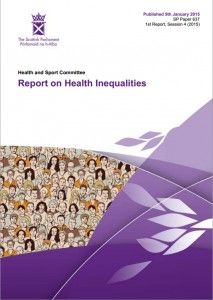
The report was published on 5 January
A Scottish Parliament report published on Monday states that recent initiatives aimed at reducing wide health inequalities between affluent and deprived communities have not made any significant difference.
The report, produced by the Scottish Parliament’s Health & Sport Committee as part of a health inequalities inquiry, highlights the scale of the current disparity by noting that a boy born today in Lenzie, East Dunbartonshire, can expect to live until he is 82, while a boy born eight miles away in Calton, Glasgow, has a life expectancy of just 54.
The paper argues that “economic growth alone… will not be sufficient to address structural health inequalities”, and that the NHS will not be able to make substantial progress in tackling inequalities without developing a new approach that features greater support from partner organisations.
Discussing the Committee’s findings, its convener Duncan McNeil MSP said that: “That your income, your education and where you live contribute to how healthy you are is an issue that, as a society, should bring us significant shame. Our NHS can offer a sticking plaster, but without a new approach we will not tackle the root causes of inequality and improve the health outcomes of thousands of people across Scotland.”
The report’s conclusions are consistent with SURF’s position that a holistic approach – involving effective collaboration across public, private, community and voluntary sectors – is required to effectively address social and economic challenges in Scotland’s disadvantaged communities.
SURF’s Scottish Government supported Alliance for Action programme is promoting and testing the scope for practical cooperation in two specific case study areas. We recently produced an interim report on that collaborative work so far, with comment on the real and potential relationships between local regeneration assets & activities and national regeneration agency policies & resources.
